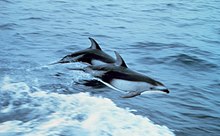Dolphin Strategy
The Delphi strategy is a technique to conduct coordination and alignment in a team from the management theory that was developed in the US by Dudley Lynch and Paul Kordis. The Delphi Strategy is a licensed method whose trademark owner and licensor the Brain Technologies Corporation of Gainesville Florida is.
methodology
The teaching is based on the behavior of various marine animals, to which certain properties are ascribed. These properties are projected onto organizations to categorize their behavior. The dolphin strategy relies on emotional intelligence , flexibility and cooperation .
The developers of the dolphin strategy assume that dolphins change their behavior quickly and precisely in a team if they do not achieve what they are aiming for. The trainers and authors Dudley Lynch and Paul Kordis have observed these skills and, together with the behavior of sharks and carp, symbolically transferred them to people and organizations in dealing with change. A key message is that changes in conventionally run organizations are usually made too late. The consequence of this is that avoidable yield and energy losses occur with conventional management.
The symbolic image of the dolphin indicates a community in which each individual member retains their individuality and at the same time optimally uses their skills as part of a whole. This should also be able to be worked out with customers and business partners or the family as a social system .
According to Lynch and Kordis, employees who behave like a dolphin use the qualitative advantage of being open to everything that works. You do not try to do the old again and again with increased effort, but look for new solutions, alternatives.
The following principles apply, whereby the formulations are based on the method descriptions and are deliberately emotionalizing. They have little to do with the actual behavior of dolphins, they are metaphors , the wording of which may not be scientifically verified, but which are used as part of the product marketing of the method to make the desired analogies easier to remember :
- Flexibility : looking for solutions, constantly questioning yourself. When dolphins don't get what they want, they change their course of action very quickly.
- To question : renounce dogmas and take meta positions in strategy development.
- Toughness : Dolphins don't give up easily. Unless they see a benefit in it.
- Winning : Dolphins enjoy winning. Your brain is capable of emotional sensation. Managers who act accordingly do not feel the need for someone else to lose ( see also: Win-Win ).
- Cooperation : Dolphins work well with others but also act competently on their own. All in all, cooperation brings more than competition or the independent search for private advantages.
- Vision : Visions for one's own path, for a team goal or in the company only create identification with a goal.
- Elegance : Dolphins love precise, clean and, above all, simple - elegant - solutions. Elegant negotiation means, for example, that the solution must lead to long-term satisfaction and make sense for both parties.
application
In the opinion of their authors, dolphin strategies should be practical in various areas:
- Initiation and support of change processes in organizational development
- Creating a corporate culture that is lived together
- Empowerment - empowering people to perform with enthusiasm
- Team development and collaboration between teams
- Improve communication and collaboration
- Individual and team coaching
- Support of personnel planning and personnel development ( assessment and development center )
criticism
On the way criticism is that the marketing metaphors from the animal kingdom - the popular dolphin as popular figures are used which have no basis in - behavioral research have. In addition, the form in which the management method is compared with apparently authentic animal behavior is described as misleading and the marketing efforts as contrary to the philanthropic message of the method.
literature
- Dudley Lynch, Your Dolphin High-Performance Business Brain. An operator's manual. , Brain Technologies Press, 1993. ISBN 0-945822-04-9 .
- Dudley Lynch, Dolphin Thinking. Profit with the brain. , Rudolf Haufe Verlag, 1996, ISBN 3-448-03318-9
- Dudley Lynch, Paul Kordis, Dolphin Strategies. Management strategies in chaotic systems. , Henrich 1998, ISBN 3980636313
- Dudley Lynch, Paul Kordis, The Key to Globalization. Handbook for Change. , Junfermann Verlag 2000, ISBN 978-3873871847
- Dudley Lynch, Paul Kordis, DolphinThink. Mastering the Skills You Need to Get Touch, Get Free, Get Focused and Get Going as a New Kind of Winner. , Brain Technologies Press 1997, ISBN 0-945822-02-2
